DeSantis talks tough on China, takes cash from China-backed company
- Oops!Something went wrong.Please try again later.
- Oops!Something went wrong.Please try again later.
Florida Gov. Ron DeSantis has made his tough stance on China a signature issue in his presidential campaign.
DeSantis has gone on the offensive against Chinese influence in recent months, signing a bill restricting what land Chinese companies and citizens can buy in Florida and suspending state scholarships to several Florida schools over alleged links to China.
But this August he took a check for more than $11,000 from the CEO of a Tampa refrigerant company with direct backing from China. It was just the latest in years of financial support that the company, iGas USA, has given DeSantis.
Last year DeSantis even held a rally at the Chinese-backed refrigerant company’s Tampa complex.
The rally and contributions are part of a recent wave of political giving by iGas and entities associated with its CEO, Xianbin (Ben) Meng. All told, the companies and employees have made more than $1.1 million in federal and state political contributions in the past five years, with 98% of the money going to Republican candidates and committees. The lion’s share of that money, $340,000, went to DeSantis and committees affiliated with him.
While Meng donated to former President Donald Trump in 2016, DeSantis is the only Republican presidential contender who has gotten a check from the company or its employees this cycle.
The political giving represents a sharp increase in political activity by both the companies and employees, many of whom had no prior record of political donations.
Much of the spending has benefited politicians in Florida, several of whom urged the U.S. Environmental Protection Agency (EPA) to adopt rules that would benefit the company.
Corporate records and court filings show that a state-controlled Chinese company owns around a third of iGas USA. American competitors of iGas have charged in comments to the EPA that the Tampa company’s import of cheap, Chinese-made refrigerants has hurt domestic producers.
Increased political giving by iGas began as Congress considered — and ultimately passed — a bill that phases out the types of refrigerants that iGas imports from China. The synthetic greenhouse gases known as hydrofluorocarbons, or HFCs, are largely used to cool refrigerators and air conditioners, but are considered major drivers of climate change. The gradual reduction is one of numerous measures the United States has taken to maintain compliance with international climate agreements.
Meng’s company has had some success pushing for changes to the implementation of the law — changes that would help it secure import allowances that he once estimated could be worth billions of dollars in profit.
Meng has gotten assists in his efforts from several Florida members of Congress who have been big beneficiaries of this political giving.
Leading the charge has been Tampa-area Republican Rep. Gus Bilirakis, who co-authored at least two letters to the EPA that closely mirrored iGas’ own arguments to the agency about the implementation of the law, though neither explicitly mentioned the company. Committees supporting Bilirakis have taken in at least $96,000 from iGas employees and one of Meng’s companies.
One of the letters was co-signed by two Tampa-area Republicans who shared the stage with DeSantis at the 2022 rally and who have also taken big checks from iGas employees and affiliated companies: Rep. Anna Paulina Luna and Rep. Laurel Lee.
Like DeSantis, Bilirakis, Luna and Lee have all used tough rhetoric in talking about China in recent months, with Bilirakis saying earlier this year that “China will stop at nothing to undermine our country.”
Trade relations between the United States and China have been fraught for decades. While Chinese-made goods have typically led to lower prices for American consumers and businesses, economists have found they also cost millions of American workers their jobs.
When Donald Trump was president, his administration imposed tariffs on Chinese goods in 2018 that initiated a trade war between the two countries.
Politicians contacted by the Herald said that they saw their advocacy on behalf of iGas as providing assistance to a local business and said that accepting contributions from Meng’s companies and employees didn’t conflict with their opposition to Chinese influence.
Meng never responded to a detailed list of questions about the company’s business practices, ownership and political activity despite requesting that the Herald send them when reached by phone.
A bigger allowance
The uptick in political giving — and scrutiny of Meng’s company — intensified in the wake of the passage of the 2020 American Innovation and Manufacturing (AIM) Act. Signed into law by Trump, it curtails the use of HFCs in phases over the next two decades and assigns credits to companies based on their prior market share that determine the quantity of refrigerants they can produce or import. The EPA is tasked with implementing the law.
Meng anticipated that having a big piece of this shrinking pie could be lucrative. In a 2018 e-mail disclosed in a lawsuit filed by one of Meng’s former suppliers, Meng wrote to an employee of the accounting firm Grant Thornton that his companies had “real value in the allocation to import HFCs” and compared the situation to an earlier refrigerant phaseout where prices increased as supply became limited.
“We are the largest importer and sales of HFC,” Meng wrote. “[We] should have the largest import allowance among all importer, users.”
Meng estimated the company’s potential HFC allocation could be worth between $2.2 and $4.4 billion in total profits over the next 20 years.
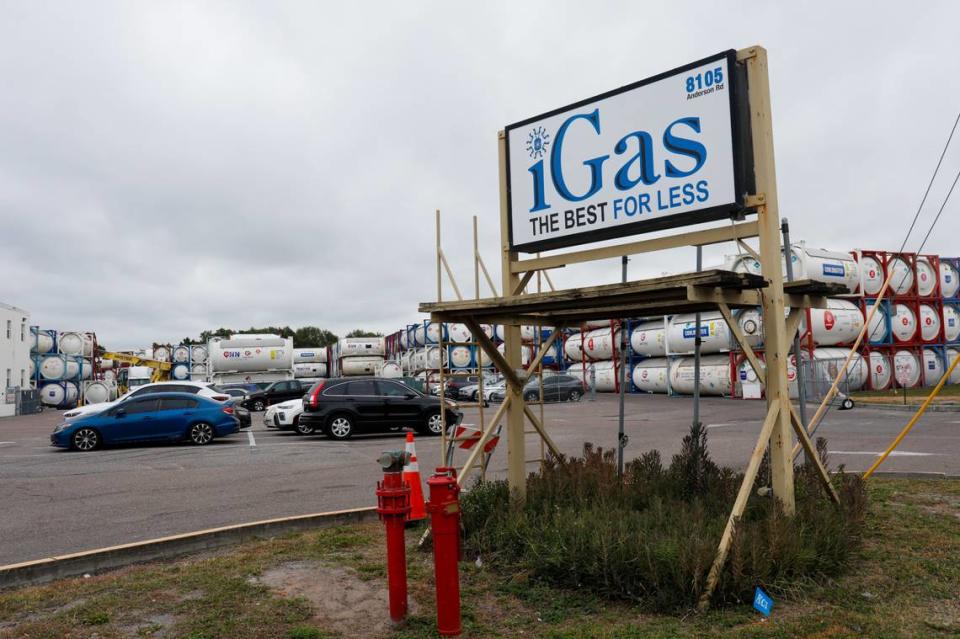
But in order to realize that full potential, Meng would need the EPA to modify the rules of the AIM Act, which used consumption and production data from several years before the law’s passage to determine each company’s allocation.
In numerous comments submitted to the EPA, iGas has argued the formula is unfair because the company has increased its market share in recent years. In September, iGas and its affiliates took their complaints one step further, filing a court petition calling the agency’s methodology “arbitrary and capricious.”
iGas’ competitors have argued in comments to the EPA that iGas should be granted fewer allowances because of its connection to China and allegations that the company and its affiliates have circumvented tariffs on imported refrigerants from China.
As iGas’ fight with the EPA has intensified so, too, has its political giving. Contributions by iGas-connected companies and employees increased from just over $10,000 in 2019 to more than $800,000 in 2022.
DeSantis has been the biggest beneficiary of that giving, with committees tied to the Florida governor receiving more than $340,000 from Meng, his companies and employees, including in-kind contributions connected with the 2022 rally.
The DeSantis campaign said in a statement that the Herald’s reporting “look[s] silly in the face of his actions and record towards China as a governor.”
“Since becoming governor, Ron DeSantis has worked tirelessly to root out CCP influence and guard against it,” said Bryan Griffin, press secretary for the campaign, referring to the Chinese Communist Party.
Florida’s two Republican senators, Marco Rubio and Rick Scott, have also been big beneficiaries, with committees supporting Rubio taking in more than $110,000 and committees supporting Scott taking in more than $35,000.
Both senators have met with company officials, though they said they hadn’t taken any actions to help the company in its dispute with the EPA.
“[If] iGas supported Senator Rubio in the hopes of influencing his work they obviously wasted their money,” Rubio’s office said in a statement.
The company has, however, gotten assistance from several members of Congress who also benefited from the company’s giving.
In August 2021, Bilirakis co-wrote a letter to the EPA mirroring iGas’ call for adjusting the baseline years used by the agency to determine company allocations. It argued that “imports have been a significant factor in keeping refrigerant costs affordable, the continued presence of a robust import market of HFCs is critical.”
If the letter sounded like it could have been written by iGas, it’s because large portions of it were: The Herald found that more than 40% of the text in the August 2021 letter was identical to earlier public comments the company had submitted to the EPA.
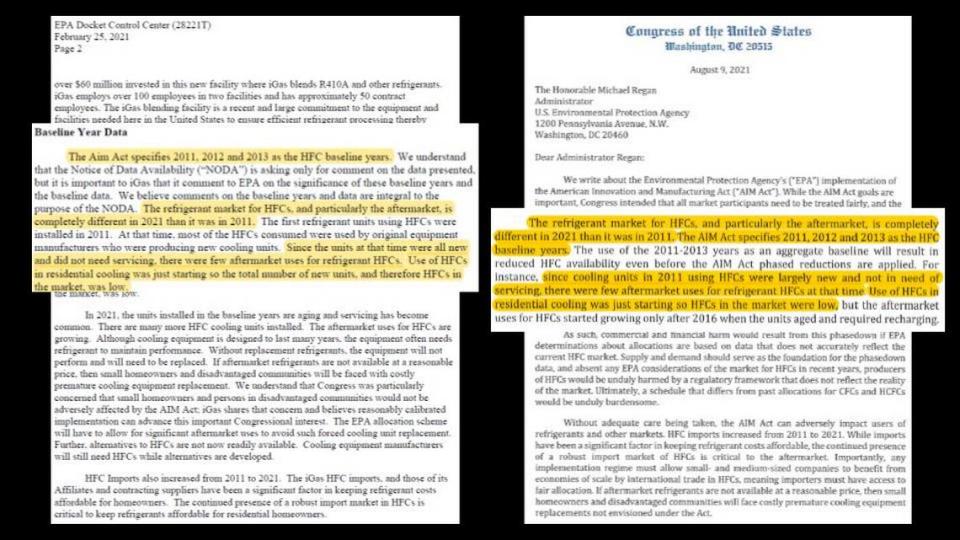
The EPA ultimately agreed to incorporate data from later years, when iGas had a higher market share, which would allow the company to import and sell more HFCs.
Bilirakis has a “long-standing relationship” with iGas executive Marc Middleton, said Summer Blevins, deputy chief of staff to the congressman, and regularly talks with local businesses about how they can cut through the bureaucratic red tape.
“It is not unusual for those conversations to culminate in letters to regulatory agencies as the congressman seeks to create a level playing field in which the government does not pick winners and losers from within certain industry sectors,” she said.
Blevins added that Bilirakis’ advocacy on behalf of iGas wasn’t “at odds with his America-first stance.”
Bilirakis again contacted the EPA earlier this year, arguing that the agency should consider company data from 2020 and 2021 in determining future allocations, the same stance iGas had taken.
Bilirakis was joined on this letter by several other Florida Republican members of Congress, including Vern Buchanan, Scott Franklin, Laurel Lee and Anna Paulina Luna. All, except for Buchanan, have been the beneficiaries of contributions from iGas-affiliated companies and employees.
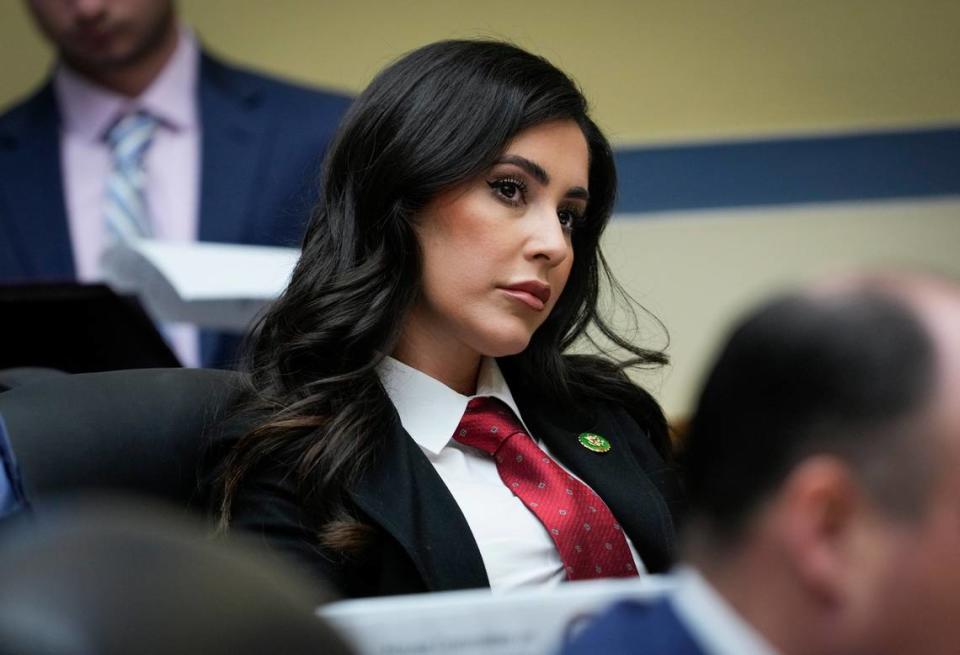
Luna’s office said that she was “disturbed” to learn of iGas’ Chinese ties and had signed on to the letter after it was circulated by Bilirakis.
Both Franklin and Lee cast their support for iGas as part of their commitment to helping local businesses navigate federal rules and regulations.
Coordinated effort
Saurav Ghosh, a former enforcement attorney at the U.S. Federal Election Commission, said the relationship between iGas and these politicians represents “corruption light,” though he said it is likely not illegal.
He said that while courts have narrowed the definition of what counts as public corruption, this example highlights worries about the potentially corrosive impact of money on politics.
“You have a corporation that is using its money to get political influence makers behind it,” said Ghosh, now the director of federal campaign finance reform at the nonpartisan Campaign Legal Center.
The vast majority of the political giving was done by two of Meng’s companies, iGas and Cool Master Pro.
Federal campaign finance laws prevent contributions from foreign nationals or corporations, but that doesn’t apply to companies that are partially owned by a foreign company, like iGas.
Much of the more than $200,000 in political giving by iGas employees appeared to be coordinated, with employees giving the same amount to the same committee on the same date.
On Sept. 28, 2020, for example, Meng and two others described as executives — Middleton, listed as a president at iGas, and Douglas Sutherland, listed as CFO — each gave $2,800 to Bilirakis’ congressional campaign.
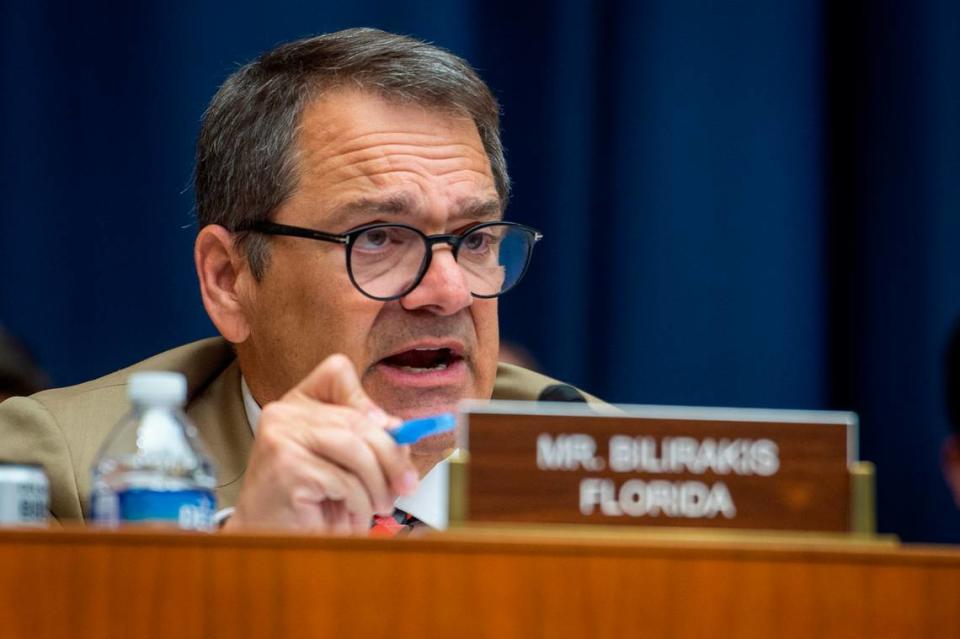
The following month, Middleton, Sutherland and Sutherland’s wife Jie Su, each gave $2,800 on the same day to Rep. Franklin.
Jie-Su Sutherland said the contributions listing her husband as an employee at iGas were a mistake, and that he doesn’t actually work at the company, but had no explanation why he was listed as a CFO on the contributions.
While coordinated giving is not illegal, donations given on behalf of someone else, known as straw donations, would be illegal. Sutherland denied that she and her husband had been directed to give, or reimbursed for their giving.
“It is myself and my husband’s decision,” she said.
Middleton didn’t respond to numerous requests for comment.
Meng made one contribution this summer that stood out.
Records showed that he gave a total of $13,200 to Wyoming Republican Congresswoman Harriet Hageman, twice the legal limit. But on the same day, the record was amended and half that money was attributed to Meng’s spouse, listed as Qin Xie, although the pair haven’t been married in nearly a decade.
“It does raise the question of whether the spouse really gave this money or whether it’s papering over the fact that they hit the contribution limit,” Ghosh said.
Qin Xie declined to answer questions about the contribution or her relationship with Meng.
Hageman’s office didn’t respond to questions about the contribution, either.
From rags to regulations
Meng first entered the air conditioning industry in the early 2000s. He was certified as an air conditioning contractor in Florida in January 2003, after moving to the United States from China several years earlier to follow Qin Xie, who was then studying in Utah.
Meng, who holds U.S. citizenship, has created a network of refrigerant and air conditioning companies, including BMP International, BMP USA, LM Supply and Cool Master Pro, among others, that have primarily imported products directly from China.
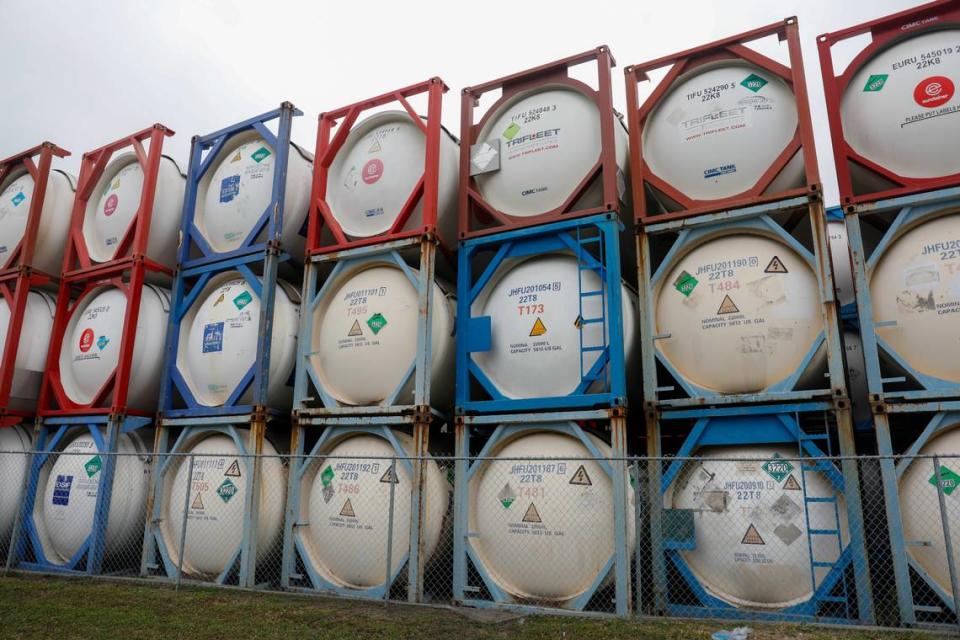
iGas USA was created in 2018 as a joint venture between Meng and Zhejiang Juhua, a major Chinese manufacturer of refrigerants that the Commerce Department determined to be controlled by the Chinese government. Under the terms of the joint venture agreement, disclosed in a 2022 lawsuit, Zhejiang Juhua invested $10 million in the fledgling iGas and retained a 34% stake in the company.
Meng has said that iGas now supplies roughly 50% of the market for replacement refrigerants.
Under U.S. trade laws, foreign countries are prohibited from flooding the American market with undervalued products that would harm the domestic market, a practice known as dumping. After complaints from American refrigerant companies, the Commerce Department levied extra duties on numerous types of HFCs imported from China in 2016. But Meng’s American competitors accused Meng’s companies in government filings of taking numerous steps to evade paying these extra taxes, which his companies have disputed.
Earlier this year, the EPA fined Meng’s companies $382,473 for failing to report the quantities of refrigerants they imported, as required by the Clean Air Act’s Greenhouse Gas Reporting Program.
And Meng appears to realize that his company could face financial penalties in the future. It’s spelled out in his 2020 divorce settlement with his second wife, Linna Shi. Under the terms of the agreement, Meng alone would be “responsible for any ongoing or potential loss from law suit, or anti-dumping fines.”

